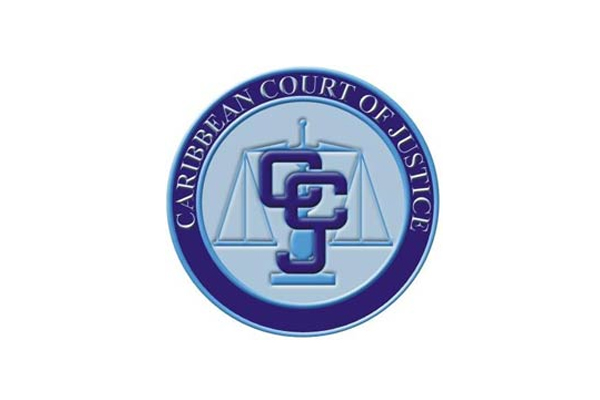Norman Manley Law School Emerges Victorious at the 12th Annual CCJ International Law Moot
Port of Spain, Trinidad and Tobago March 22, 2022 — On Friday, 18 March, the Norman Manley Law School was announced the overall winner of the XII Annual Caribbean Court of Justice’s (CCJ) International Law Moot Competition. It is the fourth win for the Jamaica-based law school, which bested five other teams comprising regional law schools and law faculties, to take home the Moot Challenge Shield.
Reflecting on their victory, the winning team, comprising students Shaquan Hill, Kimberly Blackwood and Iyka Dorival and adviser Taneisha Brown, dedicated their win to the late Ms Nancy Anderson. Ms Anderson previously served as a Tutor and Course Director at the Law School before passing away in 2021. Ms Blackwood, the Lead Advocate for the team, described the Moot experience as a “tremendous opportunity”. Explaining the reason for participating in the Law Moot, Blackwood stated that “having not acceded to the Appellate Jurisdiction of Court, our attorneys seldom get the opportunity to appear before the judges of the CCJ and being able to do this was just tremendous for us, and we had to seize that opportunity.”
Established in 2009 as an in-person activity to orient law students in the processes and procedures of the Court while helping them become more familiar with the Court’s Original Jurisdiction (OJ), the Moot focuses on the interpretation and application of the Revised Treaty of Chaguaramas (RTC). In its OJ, the CCJ is an international court and is the only court that has the authority to interpret the Treaty when there are disagreements concerning freedom of movement, trade and services and movement of money within CARICOM. Countries, businesses, and individuals can ask the Court to interpret the Treaty.
After a two-year hiatus caused by restrictions associated with the COVID-19 pandemic, the Court decided to host a virtual Moot in keeping with the CCJ’s current practice of hearing matters virtually. Notwithstanding the feeling of digital meeting fatigue often experienced by most students, six (6) institutions competed in this year’s competition: The University of the West Indies, St Augustine, The University of the West Indies, Cave Hill, Anton de Kom University of Suriname, University of Guyana, Hugh Wooding Law School, and Norman Manley Law School. Although there could only be one winner, all Mooters can still boast of participating in the Court’s first virtual Law Moot.
According to the Court President, the Hon. Mr Justice Adrian Saunders, during the Moot’s opening ceremony, “hosting the annual Moot is one way in which the Court can develop greater awareness of the processes designed to promote regional integration within the framework of the RTC. It is our hope that in bringing you, law students, face to face with the nuances of the Revised Treaty, with the procedures for pursuing the rights bestowed by it, and with the Court that interprets and applies the Treaty, that this will ignite your passion as practitioners and scholars for the advancement of Community law.”
Court Registrar and Chief Marshal Jacqueline Graham indicated in her remarks at the Closing Ceremony that “I am proud of our Mooters and our Moot Registry Team – for the hours they have put in to understand court hearings and how the engine room of a court works and what is required to appear before the panel of judges, and for the excellence they displayed in doing so.”
This year’s Moot question was argued before a panel of three judges, including the Honourable Messrs. Justice Wit and Anderson and the Honourable Mme. Justice Rajnauth-Lee. The scenario concerned Article 214 of the RTC, which deals with referrals from national courts to the CCJ, where the matter in question requires the interpretation and application of the RTC. Senior Counsel for the Claimant were to argue that the Defendant is liable for the failure of its courts to refer the classification issue while Junior Counsel were to contend that there was no discretion in the courts not to refer. Senior Counsel for the Defendant were to contend that there can be no state liability for the actions of its independent courts generally and certainly not for the actions of the Privy Council while Junior Counsel were to argue that the domestic courts have a discretion whether to refer and that the Claimant ought to have assisted the courts by raising the issue (which it had not done).
The second-place prize was awarded to the 2019 winners, Hugh Wooding Law School, while the Anton de Kom University of Suriname received the prize for “Best Team from an Academic Institution,” a first for that university. The University of the West Indies, Cave Hill won the “Social Media Spirit Prize”, a new aspect of the competition that engenders camaraderie and increases digital support for the participating teams.
Members of the public interested in viewing the competition, recordings of the teams’ presentations and the award ceremony can visit the Court’s YouTube channel. The content can also be accessed via the Court’s website at www.ccj.org.

